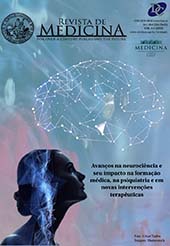Beyond Broca’s area
why undergraduate neuroscience education matters
DOI:
https://doi.org/10.11606/issn.1679-9836.v98i4p238-240Palavras-chave:
Área de Broca, Estudantes de Medicina, Educação de Graduação em Medicina, NeurociênciasResumo
Patients with psychiatric illness often present a unique challenge to medical students: in contrast to some medical conditions, in which patients may seem to be stricken by a disease, patients with certain psychiatric illnesses may seem complicit with the illness. Questions of free will, choice, and the role of the physician can quickly become overwhelming. This may result in students feeling helpless, disinterested, or even resentful. Here we argue that integrating a modern neuroscience perspective into medical education allows students to conceptualize psychiatric patients in a way that promotes empathy and enhances patient care. Specifically, a strong grasp of neuroscience prevents the future physician from falling into dualistic thinking in which the psychosocial aspects of a patient’s presentation are considered beyond the realm of medicine. The value of incorporating neuroscience into a full, biopsychosocial formulation is demonstrated with the case example of a “difficult patient.”




